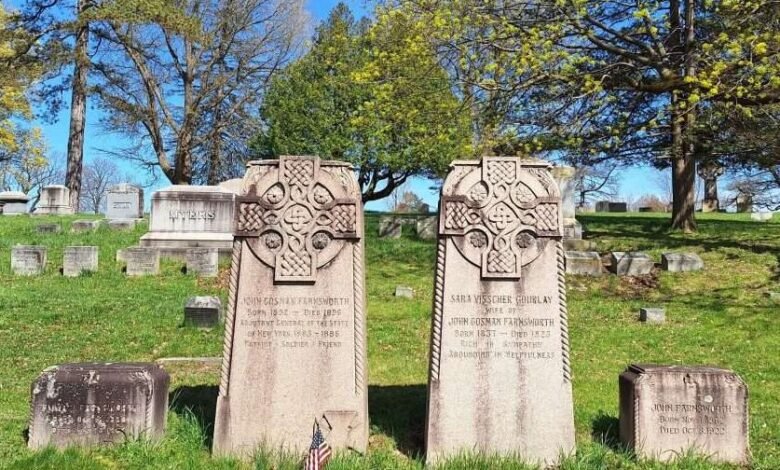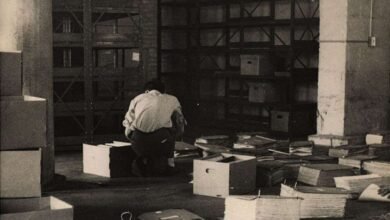Victorian Mourning Letters for General Farnsworth of Albany


 General John Gosman Farnsworth (1832-1895) of Albany served in the Army of the Potomac in the Civil War and was later Assistant Quartermaster of the New York State Volunteers and Adjutant General under President Grover Cleveland.
General John Gosman Farnsworth (1832-1895) of Albany served in the Army of the Potomac in the Civil War and was later Assistant Quartermaster of the New York State Volunteers and Adjutant General under President Grover Cleveland.
After his death in Washington, D.C. in April 1895, dozens of condolence letters were sent to his widow Sarah Gourlay Farnsworth (1837-1893) at 26 Elk Street in Albany.
These intriguing handwritten letters are now contained in a memorial scrapbook, part of the Farnsworth Family Papers Collection at Albany County Historical Association (ACHA). All the letters have been transcribed – a partnership of ACHA staff and volunteers and are available online at New York Heritage.
Victorian Era Mourning
Death was highly visible during the Victorian era. It was accepted as part of life and was seen as a manifestation of God’s will. Death itself was not particularly feared, but proper mourning was of the utmost importance. There were strict customs regarding wearing dark clothing, the length of mourning (two years for widows), social isolation, and photographs of the deceased.
According to the Victorian Web, another custom was expressing deep sympathy using stationery bordered in black. This was known as mourning stationery which was used by the grieving family and friends.
It generally had thick borders soon after a death, then narrowed over time. According to a Wikipedia article, this type of stationery was first used in Europe during the 17th century. Mourning letters, usually sent by the family, created an important connection between sender and receiver which helped to facilitate healing and diminish isolation.
Letters to Sarah Farnsworth
The sympathy letters sent to Sarah Farnsworth in 1895 were full of emotion. Both men and women poured their hearts out, aching for her and the children. Many had religious sentiments, mentioning a faithful partner torn away, which only God can comfort.
The Farnsworth family was well known and respected in Albany and throughout the country. Letters were sent by friends, family, veterans, and ministers. Most of them have black borders of varying thickness, though it appears that some may have been mounted on black paper, thus creating black borders. Other examples of Victorian mourning letters from many different states can be found here.

 The following are excerpts from some of the letters sent to Sarah Farnsworth, in April and May,1895. What do these quotes tell us? These written expressions of emotion are more intense and lasting than the texts or printed cards of today.
The following are excerpts from some of the letters sent to Sarah Farnsworth, in April and May,1895. What do these quotes tell us? These written expressions of emotion are more intense and lasting than the texts or printed cards of today.
Carolyn Ten Eyck, New York City (friend): “My dear Mrs Farnsworth. I am so shocked and pained by the news which has come to me today of your great sorrow & loss… My heart is with you, aching for you. I shall follow you closely each of these weary days…”
Gerard I. Whitehead, New York City (Civil War veteran and attorney): “My dear Sara… I need not tell you how sorry I am for you and Emma [daughter] for it is a heavy load of sorrow on my own heart… it is like a death in my own dear family and to me seems as sudden and unanticipated as a death in battle…”
Father Maguire [Francis J. Maguire], Sacred Heart Rectory, Albany: “Mrs. Farnsworth Dear Madam. Permit me to express my sympathy in the great affliction which rests upon you at the moment, and hope that God will sustain and console you… I am sure God will not leave you without the assurance of his presence…”
Cousin Helen Stokes, The “Cedars”, Windsor [mailed from Detroit]: “My dear Sarah. We have been drifting apart for many years but in heartfelt sympathy I am with you now. Believe me your grief is mine – my sympathy yours, and I trust joy eternal, a reward of a life spent in good deeds belongs to your dear departed husband…some day God, for reasons infinitely kind, sows the path of love with thorns…”
Mary C[leveland] Hoyt, Beatrice, Nebraska (sister of President Grover Cleveland; wife of merchant William E. Hoyt): “Dear Mrs. Farnsworth. My heart goes out to you in warmest sympathy in your bereavement…May the most abundant grace and Heaven’s own consolation be yours…”

 C.[Christian] T. Christensen, Brooklyn, NY (Civil War Lt. Colonel, Ass’t Adjutant General): “My dear honored friend: in this hour of great anguish, more dear, and more honored than ever before I send you… the assurance of my deepest sympathy. We know that for the beloved departed ones, we need not grieve, for them it is a transfer to that blessed region where there is no sickness or pain or sorrow…”
C.[Christian] T. Christensen, Brooklyn, NY (Civil War Lt. Colonel, Ass’t Adjutant General): “My dear honored friend: in this hour of great anguish, more dear, and more honored than ever before I send you… the assurance of my deepest sympathy. We know that for the beloved departed ones, we need not grieve, for them it is a transfer to that blessed region where there is no sickness or pain or sorrow…”
Cornelia Van Rensselaer Thayer Robb, Park Ave., New York (friend, daughter of Nathaniel Thayer; wife of banker James Hampden Robb; granddaughter of Stephen Van Rensselaer IV): “My dear Mrs Farnsworth… I admired your husband so much, not only for his manliness and perfect uprightness, but for his beauty of character… I am praying…that God will send you his peace and strength which so far exceeds any earthly love and sympathy…”
Harriet Van Rensselaer Crosby (daughter of Stephen Van Rensselaer IV) “My dear Mrs Farnsworth. I almost hesitate to intrude upon your grief, but I want to assure you of my sincere sympathy in your great sorrow. God has indeed called you with the deepest water of trouble… your tears will bring you to say ‘Thy will be done’…”
Lucy Moody Rogers-Harris (friend, wife of Albany Judge Hamilton Harris):”My dear Sarah, You have been passing through deep waters, but you remember the promise – ‘When thou passeth through the waters I will be with thee they shall not overflow thee’ “
C.T.R. Matthews [Catherine Theresa Romeyn Van Cortlandt Matthews] (friend, daughter of Pierre Van Cortlandt III; widow of Rev. John Rutherford Matthews, USN), Croton on Hudson: “Dear Sara… I can give you very near sympathy for we are bowed over with sorrow – my dear Mother entered into Rest on the 12th of January & it seems as if we could not be reconciled to her loss -so we can give very true sympathy to others who sorrow” [on wide margin black bordered stationery]
Helen E. Greig, 126 State St., Albany: “My dear Mrs. Farnsworth… I am sorry for you now in the grief that is yours to bear. No words can assuage the sorrow. It will be a solace to you to know an honest man went to his home in that other country called Paradise.”
Note: Helen wrote “Owney the Post Office Dog” in 1895 about a dog who had wandered into the Albany Post Office and became a celebrity. The dog also traveled around the country, riding on trains. Helen was also involved in many charities and President Lincoln sent her a Carte de Visite photo of himself for her services rendered to the soldiers during the Civil War.

 Jeannie T. Durant (friend; wife of Albany grain merchant Edward P. Durant): “My dear Mrs Farnsworth… how unduly and truly I sympathize with you in your present affliction and loss and to express the hope and belief that our heavenly Father will sustain and strengthen you and give you faith and courage to go bravely on to the end with life’s duties and trials…”
Jeannie T. Durant (friend; wife of Albany grain merchant Edward P. Durant): “My dear Mrs Farnsworth… how unduly and truly I sympathize with you in your present affliction and loss and to express the hope and belief that our heavenly Father will sustain and strengthen you and give you faith and courage to go bravely on to the end with life’s duties and trials…”
Grace Corning [Grace Fitz-Randolph Schenk Corning Ward)] (neighbor on Elk St., wife of Erastus Corning (1852-1897); Grace remarried Dr. Samuel B. Ward): “Will you take my deepest sympathy with you through these days? I too have walked through the valley and it never ends dear friend…”
Sarah Vischer Gourlay Farnsworth died in January 1923 in Albany, New York. She was buried at Albany Rural Cemetery, along with her husband John and other family members.
A newspaper obituary in the scrapbook states “The last of the social queens of Albany’s old regime, laid down her scepter when death yesterday brought to an end the long reign of Mrs. John G. Farnsworth… She won and held a legion of friends through the magnetism of her personality and the charm of her gracious mentality…”
She was survived only by her daughter Emma Justine, her son John having died in October 1922.
Illustrations, from above: The Farnsworth family plot in Albany Rural Cemetery; and courtesy Albany County Historical Association Manuscript Collections, Farnsworth Family Papers & New York Heritage, General John G. Farnsworth; General Farnsworth and his wife Sarah Gourlay Farnsworth; and Emma Farnsworth by a window.
Source link




